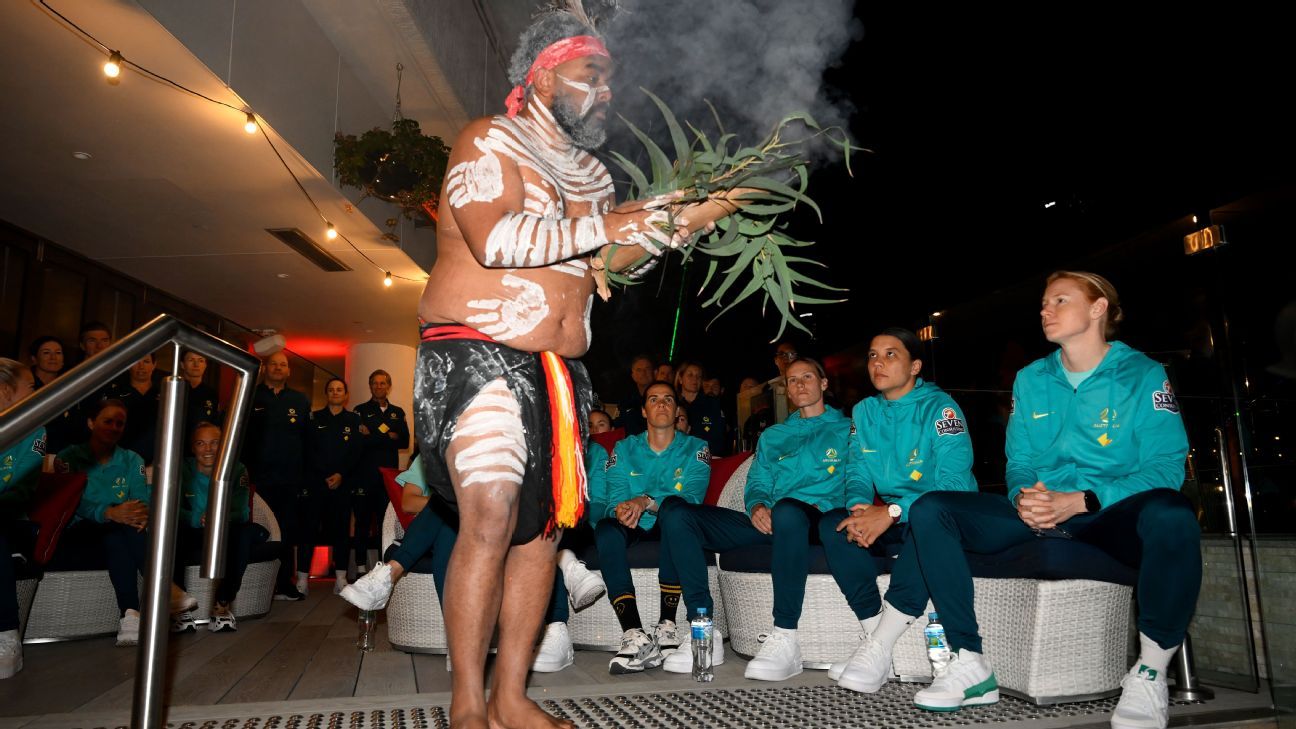The 2023 FIFA Women's World Cup has been a tournament of firsts. With two hosts from two federations, things have been done a little differently. And that has extended to the way in which the tournament has branded itself, and the concerted effort from the host nations, their federations, and FIFA, to celebrate First Nations and Māori culture.
First, a quick history lesson. First Nations people are the Indigenous peoples of Australia. With more than 250 language groups spread across the country, Indigenous Australians boast the oldest continuous living culture in the world dating more than 60,000 years.
- What to know about Australian football ahead of World Cup
- Best players at 2023 Women's World Cup: Morgan, Marta, more
- Women's World Cup: Home | Squads | Fixtures | Podcast
Far from a homogenous group, the different tribes and nations have their own languages and customs. The names of cities and towns used in Australia today are a product of colonisation, but every city also has a traditional name.
It is a similar story across the Tasman Sea.
Māori people have been on the land of New Zealand for more than 1,000 years, with a unique culture, language, and more than 100 iwi, or tribes. In New Zealand, there has been a much more concerted effort to make Māori language and customs a part of everyday life. Modern New Zealand is often referred to as Aotearoa, which translates to "land of the long white cloud."
New Zealand, the Football Ferns, play the opening match of the World Cup in Tāmaki Makaurau/Auckland, while the Matildas will host their opener at Stadium Australia, which is on Wangal land.
The inclusion of First Nations and Māori culture has not just been limited to city names. Indigenous and Māori design and art are present in the logo and wider visual branding for the World Cup.
The Australian flag, Aboriginal flag and Torres Strait Islander flag will fly at every match played in Australia, while the New Zealand flag and Tino Rangatiratanga, the Māori flag, will be present at every match in New Zealand. This comes after a request from the federations of the host nations was approved by FIFA earlier this month.
Teams travelling to Australia and New Zealand have mostly embraced the traditional owners and tangata whenua, people of the land, in the two countries. Videos of traditional ceremonies and Welcomes to Country have been splashed across the social media of teams such as Republic of Ireland, Nigeria, England and Australia.
Welcome to Country is exactly as it sounds. Performed only by the traditional owners of the specific land you are on, they welcome you, to show the same respect they hope to receive in return, and grant your spiritual being safe passage and protection while on the land. It is a generous and genuine act of respect. A Welcome to Country differs from an Acknowledgement of Country: The latter can be spoken by anyone, but a Welcome to Country can be conducted only by the traditional owners of the land.
In New Zealand, a Pōwhiri, a Māori welcoming ceremony which consists of whaikōrero (a formal speech), waiata (singing) and kai (food) is performed. The ceremony is led by members of the local iwi or hapu (sub-tribe), and the intentions of visitors are tested to prove that respect will be shown.
The seven nations based in Auckland for the group stage -- Norway, Philippines, United States, Vietnam, Portugal, Italy and Argentina -- all took part in a Pōwhiri before the start of their Women's World Cup journey, but the welcomes have not been without controversy. Spain and the Netherlands have come under scrutiny for posting clips to social media that showed players mocking the haka, a traditional war dance or challenge used before sporting events to show the strength and unity of the New Zealand team. The Netherlands claimed no mention was made of the haka in their clip that was taken down, despite closed captioning showing the word haka clearly said, but Spain apologised for their video and players have since spoken with the Rangitane tribe at a traditional welcome ceremony.

